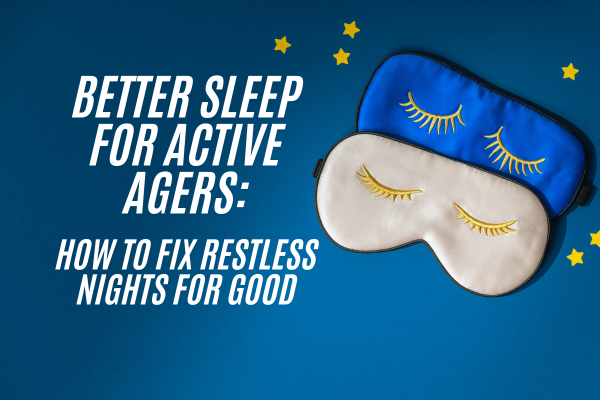Sleep is the foundation of Active Aging, and a healthy, vibrant life. For Active Agers, it restores our bodies, sharpens our minds, and gives us the energy to fully embrace each day. Yet, as we age, quality sleep can become elusive. Many older adults struggle with falling asleep, staying asleep, or waking up feeling unrested.
But here’s the truth: aging does not mean you have to accept poor sleep as inevitable. Restful nights are possible at any stage of life—with the right habits and mindset, you can reclaim the deep, restorative sleep you deserve. If you’ve been tossing and turning, waking up groggy, or feeling frustrated with your sleep patterns, don’t worry. There are simple, science-backed strategies that can help you rest better and wake up ready to conquer the day.
Let’s dive into how you can finally fix restless nights for good.
1. Stick to a Consistent Sleep Schedule
Your body thrives on routine. Going to bed and waking up at the same time every day—yes, even on weekends—helps regulate your internal clock. As Active Agers, when you follow a consistent sleep schedule, your body begins to anticipate rest, making it easier to fall asleep and stay asleep.
If your current sleep routine is all over the place, start by adjusting it gradually. Try going to bed 15 minutes earlier each night until you reach a schedule that allows for at least 7-9 hours of sleep.
2. Create a Relaxing Pre-Bedtime Routine
Your evening habits set the stage for quality sleep. Avoid stimulating activities—like watching intense TV shows or scrolling on your phone—right before bed. Instead, establish a calming routine that signals your body it’s time to unwind.
Some relaxing pre-bedtime rituals include:
• Reading a book (preferably something light and enjoyable)
• Taking a warm bath or shower
• Practicing deep breathing or meditation
• Listening to soft music or nature sounds
3. Optimize Your Sleep Environment
Your bedroom should be a sanctuary for sleep—cool, quiet, and comfortable.
• Keep it dark: Use blackout curtains or a sleep mask to block out light.
• Reduce noise: If outside sounds disturb you, try a white noise machine or earplugs.
• Cool is better: Aim for a room temperature between 60-67°F (15-19°C) for optimal sleep.
• Invest in comfort: A supportive mattress and pillows tailored to your needs can make a world of difference.
4. Watch What You Eat and Drink
What you consume during the day affects your sleep at night. Avoid caffeine and heavy meals in the evening, as they can interfere with your ability to fall asleep. Alcohol might make you drowsy, but it can disrupt sleep cycles, leading to frequent wake-ups.
Instead, opt for sleep-promoting foods like almonds, walnuts, bananas, and herbal teas (such as chamomile or valerian root).
5. Stay Active—But at the Right Time
For Active Agers regular exercise is one of the best ways to improve sleep quality, but timing matters. Try to get at least 30 minutes of physical activity most days, but avoid intense workouts too close to bedtime, as they can be too stimulating.
Gentle evening exercises like stretching, yoga, or a short walk can help relax your body and prepare you for sleep.
6. Manage Stress and Anxiety
Worries and racing thoughts can be major sleep disruptors. If you find yourself lying awake thinking about everything on your mind, consider adopting stress-relief techniques:
• Journaling: Write down your thoughts before bed to clear your mind.
• Meditation or deep breathing: Try guided relaxation exercises.
• Gratitude practice: Reflecting on positive moments from your day can shift your mindset toward peace and contentment.
Embrace Rest, Embrace Life
Quality sleep is not a luxury—it’s essential for a vibrant, active life. By making simple changes to your routine, environment, and mindset, you can finally enjoy the restful nights you deserve.
Imagine waking up each morning feeling refreshed, energized, and ready to embrace life to the fullest. That future is within your reach. To truly be an Active Ager, prioritize your sleep, take small steps toward improvement, and believe that restful nights are possible—because they are.
Jay


